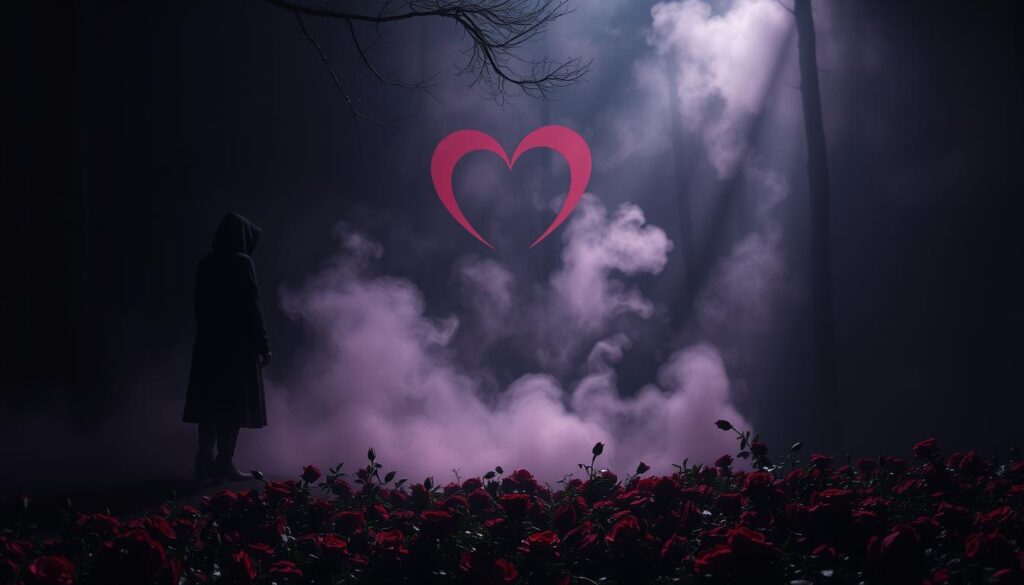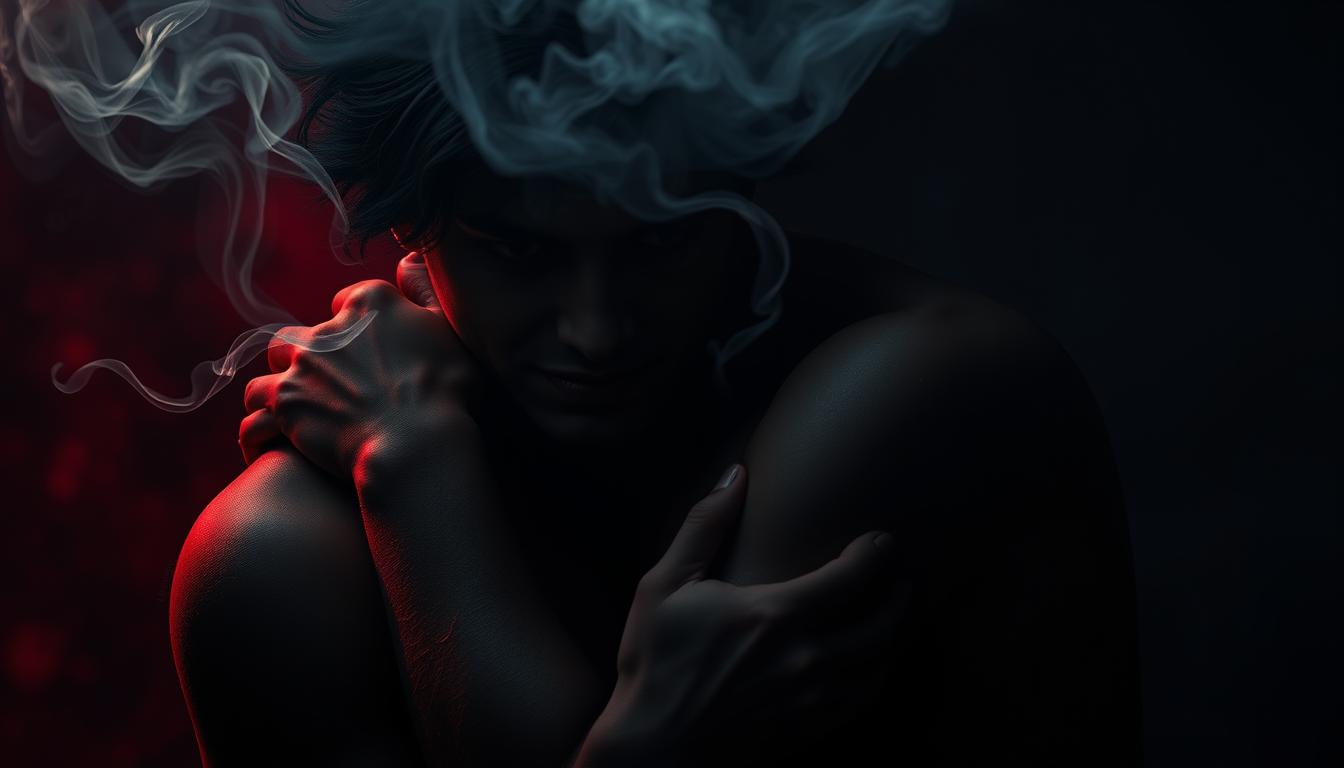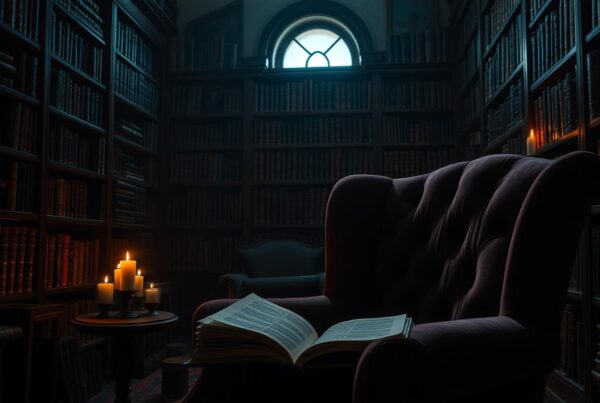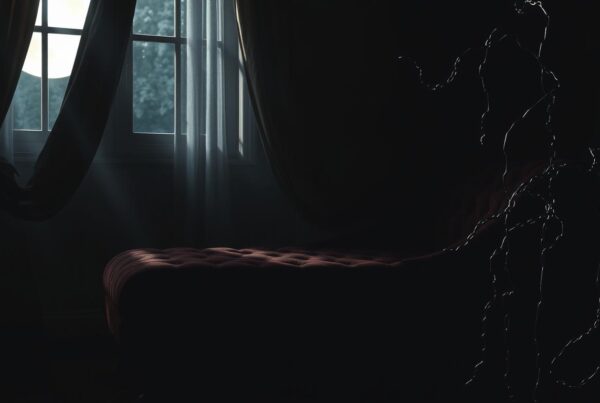Dark romance novels take us deep into the human mind. They mix the excitement of thrillers with deep love stories. This makes for a special reading experience.
These stories feature complex characters facing big emotional challenges. Authors create heroes and villains with deep inner battles. This keeps readers eager to find out what happens next.
What makes psychological dark romance unique is its focus on character depth. It’s not just about love. It’s about exploring the dark parts of our minds and how they affect our relationships.
As we dive into this genre, we’ll see the complex mix of motivations, fears, and desires. These make the characters so interesting. Get ready to enter a world where love and psychological depth meet.
The Allure of Dark Romance in Literature
Dark romance draws readers in with its deep feelings and complex characters. It mixes passionate love with dark themes. This makes for a unique reading experience.
The genre’s charm is in showing the darker sides of humans. Yet, it still offers hope for change.
Defining Dark Romance
Dark romance novels have relationships that test limits. They often have anti-heroes and characters in gray areas. These stories break away from usual romance by tackling forbidden topics and complex mind games.
Psychological Appeal to Readers
Reader psychology is key to dark romance’s appeal. These books let readers safely explore darker feelings and dreams. They provide a thrill without real-life risks, satisfying a curiosity about human nature.
Historical Evolution
The history of dark romance starts with Gothic novels from the 18th century. It has grown by adding elements from suspense, horror, and modern romance. Today, it mixes these with new storytelling ways, keeping readers hooked all over the world.
Psychological Profiling in Character Development
Creating characters is like art, mixing creativity with psychology. Authors explore their characters’ minds, making them real. They look into the character’s inner workings, not just their looks.
Writers start with a character’s backstory. This shapes who they are and why they act. Knowing a character’s past helps them react in stories.
Psychological profiles are key in dark romance. They make heroes and villains complex and interesting. These profiles include traits, fears, and desires. This makes characters feel real and close to us.
In dark romance, trauma is a big part. Authors show how past traumas affect characters now. This makes their choices and actions more clear to us.
The Anti-Hero Archetype in Dark Romance
Dark romance novels often have complex characters. They challenge the usual hero archetypes. The anti-hero is a captivating figure in these stories. They draw readers into a world of moral gray areas and intense feelings.
Characteristics of the Dark Romance Anti-Hero
Anti-heroes in dark romance novels have both alluring and troubling traits. They are often brooding, mysterious, and fiercely protective. Yet, they can also be manipulative or morally questionable.
These characters struggle with inner demons. This makes them both fascinating and unpredictable.
Psychological Motivations Behind Anti-Hero Behavior
The actions of anti-heroes come from deep psychological issues. Past trauma, fear of being vulnerable, or a twisted sense of justice can drive them. Understanding these motivations adds depth to the character.
This makes the story more immersive for readers.
The Reader’s Complex Relationship with Anti-Heroes
Reader-character relationships in dark romance novels are complex. Readers may be drawn to the anti-hero’s charm. Yet, they also question their actions.
This emotional conflict creates a unique and engaging reading experience. It keeps audiences coming back for more.
Trauma and Its Role in Shaping Characters
In dark romance novels, trauma is key in making characters deep and real. Writers use it to make characters complex and interesting. These scars shape a character’s past, affecting their choices and how they act.
Characters with a backstory of trauma are more than just people. They have fears and reasons for acting a certain way. For example, someone who was betrayed might find it hard to trust others. This makes them more relatable and real.
Scars from trauma show up in different ways in stories. They might appear as nightmares or flashbacks. These moments not only move the story along but also help characters grow and heal.
Trauma in stories is a great way for authors to talk about tough topics. It lets them show how people can overcome hard times. By using trauma in backstories, writers make stories that grab readers and stay with them.
The Dynamics of Power and Control in Dark Romance Relationships
Dark romance stories often show complex power struggles between characters. These tales grab readers with their deep emotions and psychological twists. Let’s look at how power, consent, and feelings mix in these stories.
Psychological Basis for Power Imbalances
Power struggles in dark romance come from characters’ pasts and personalities. Dominant figures might use tricks or force to keep control. Meanwhile, submissive characters might give up power because of past hurts.
This mix of power and submission creates tension and moves the story along.
Exploring Consent and Agency in Dark Romance
Consent is a tricky topic in dark romance. Writers must find the right balance between fantasy and real life. Characters often face choices that make consent blurry.
This makes the story richer and makes readers think differently.
The Fine Line Between Romance and Toxicity
Dark romance is a thin line between deep love and harmful relationships. It shows how strong feelings can lead to bad actions. Writers must be careful to keep the story engaging without showing abuse as good.
This careful balance is crucial for dark romance stories that are both exciting and responsible.
Unraveling the Psyche: Character Depths in Psychological Dark Romance
Character psychology is key in dark romance novels. Writers explore their characters’ minds deeply. They create emotional landscapes that grab readers’ attention.
Psychological analysis is vital for complex characters. Authors show their characters’ pasts, secrets, and desires. This makes characters feel real and relatable, even if they’re dark.
Characters in dark romance novels face inner battles. They deal with mixed feelings, making choices that seem strange to others. This struggle keeps the story exciting and makes readers curious.
Writers use special ways to show character psychology. They use thoughts, memories, and small actions. These help readers feel close to the characters. By diving into characters’ minds, authors offer a deep reading experience.
The Psychology of Redemption Arcs
Dark romance novels often feature character redemption as a key element. These stories captivate readers by showing psychological growth through carefully crafted narrative arcs. Characters start in dark places, grappling with past traumas or harmful behaviors. As the story unfolds, they face challenges that push them to confront their demons.
The journey of redemption involves deep psychological transformation. Characters must recognize their flaws, accept responsibility for their actions, and actively work to change. This process mirrors real-life therapy, where individuals confront painful truths about themselves to heal and grow. Readers connect with these struggles, seeing their own potential for change reflected in the characters’ journeys.
Narrative arcs in dark romance novels provide a structure for this transformation. They typically follow a pattern of crisis, self-reflection, and eventual redemption. The crisis forces characters to confront their darkest aspects. Self-reflection leads to pivotal moments of clarity and decision-making. Finally, redemption comes through actions that demonstrate genuine change and growth.
Successful redemption arcs leave readers feeling satisfied and hopeful. They show that even deeply flawed individuals can change, grow, and find love. This powerful message resonates with readers, making character redemption a beloved aspect of psychological dark romance.
Psychological Tension and Conflict as Plot Drivers
Dark romance novels are all about the mind games. They mix inner struggles with outside pressures for a thrilling story. Writers make characters face tough choices to keep you hooked.
Internal vs. External Conflicts
Internal conflicts come from what’s inside a character’s head. They might wrestle with guilt, fear, or mixed feelings. External conflicts come from others, like enemies or society. The best stories mix both for a gripping tale.

Creating Page-Turning Narratives
Great authors make you want to keep reading. They slowly share secrets, making you wonder what’s real. Cliffhangers at the end of chapters make you turn the page. These tricks keep you interested and eager for more.
Unresolved Issues in Plot Development
Dark romances often leave big questions unanswered. Characters’ pasts or hidden wishes add to the tension. As the story goes on, these secrets come out, making things more complicated. Finding answers is key to the characters’ growth and the story’s end.
Exploring Mental Health Themes in Dark Romance
Dark romance novels dive into the complex world of mental health. Authors create characters with deep psychological profiles. They explore human emotions and behavior.
These stories show characters dealing with different mental health issues. This adds complexity to their relationships and motivations.
Character mental states are key to the story. Writers include symptoms of anxiety, depression, or PTSD. This makes characters feel real and relatable.
This approach adds depth to the story. It also helps readers understand mental health better.
Dark romance goes beyond just plot. It shows the challenges of mental health. Characters living with mental health issues help readers feel empathy and understanding.
Authors do a lot of research to show mental health accurately. They talk to psychology experts and use real-life stories. This makes their stories feel true and helps reduce mental health stigmas.
The Impact of Childhood and Past Experiences on Character Behavior
Characters in dark romance often have deep emotional scars. These scars shape their personalities and actions. Childhood trauma makes them complex and relatable.
Attachment Theory in Dark Romance
Attachment styles from early childhood affect how characters relate. Those with insecure attachments may find it hard to form healthy bonds. This leads to intense and sometimes turbulent relationships in dark romance.
Generational Trauma Manifestations
Generational trauma often shows up in family lines, adding depth to characters’ backstories. This inherited pain can lead to destructive behaviors or addiction. Characters must face and overcome these issues.
Memory and Repression in Character Development
Repressed memories and forgotten traumas often drive plot twists in dark romance. As characters uncover the truth about their past, they face internal struggles. This journey of self-discovery creates a strong emotional connection with readers.
Psychological Symbolism and Metaphors in Dark Romance
Dark romance writers use symbols to tell deep stories. They choose words and images that paint vivid pictures in our minds. These symbols often show characters’ inner struggles or hidden desires.
Metaphors are key in dark romance novels. Writers compare complex feelings to simple things. This makes it easier for us to understand characters’ emotions. For instance, a locked door might symbolize a fear of getting close to others.
Subtext adds layers to the story. It’s the hidden meaning that lies beneath. In dark romance, it often shows characters’ true intentions or desires. We need to pay close attention to catch these subtle hints.
Authors use these tools to explore deep themes. A stormy night might show a character’s turmoil. A wilting flower could symbolize a dying relationship. These symbols and metaphors enrich the story, making it more engaging.
By using literary symbolism, writers craft stories that stay with us. The best dark romance novels explore the human mind deeply. They reveal truths about love, fear, and desire, drawing us back for more.
The Reader’s Psychological Journey Through Dark Romance
Dark romance novels take readers on a thrilling journey. These stories tap into deep emotions, creating a unique experience. The intense narratives in dark romance books often lead to strong reader psychology effects.

Emotional investment is key in dark romance. Readers connect deeply with complex characters, feeling their struggles and triumphs. This connection keeps readers hooked, turning pages late into the night.
The roller coaster of emotions in these stories can be both exhausting and exhilarating.
Dark romance offers a form of catharsis in literature. Readers experience intense feelings through the characters’ journeys. This emotional release can be therapeutic, allowing readers to process their own emotions in a safe space.
The dark themes and eventual resolution in these stories provide a satisfying emotional outlet.
The psychological impact of dark romance can linger long after the last page. Readers often find themselves reflecting on the characters’ choices and motivations. This deep engagement with the story can lead to personal insights and growth.
Dark romance thus becomes more than just entertainment – it’s a journey of self-discovery.
Ethical Considerations in Portraying Psychological Depth
Writing dark romance stories with deep psychology is tricky. Authors must walk a thin line between telling a good story and being responsible. It’s important to follow literary ethics to show complex characters and their minds right.
Creating characters with deep emotional wounds or mental health issues is crucial. Writers should do their homework to show these things in a real way. This makes the story better and teaches readers about different mental health topics.
When writing about dark themes, authors must think about how their work might affect readers. Using trigger warnings can help those who might find certain parts upsetting. By focusing on ethical storytelling, writers can make stories that are both engaging and safe for their audience.
Creating real and complex characters is also about being ethical. Writers should aim to make characters that are not stereotypes. This helps readers connect more with the story, leading to understanding and empathy.
In the end, mixing creativity with ethics makes the dark romance genre better. It lets writers explore deep psychological themes while still respecting their readers and the subjects they write about.
Conclusion: The Enduring Appeal of Psychological Dark Romance
Psychological dark romance grabs readers with its mix of strong feelings and complex characters. It dives deep into the human mind through exciting stories. These tales show us the real side of people.
This genre is loved because it faces tough topics head-on. It lets readers deal with their own fears and wishes. Through it, we see how dark romance challenges what we think is right.
Its lasting appeal shows our interest in the human mind. It lets us see the dark parts of ourselves and others. As it grows, it keeps giving us new views on love, pain, and healing. It’s a big part of today’s books.



